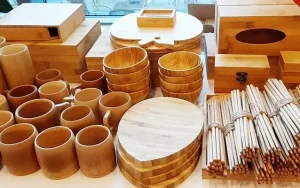
Last week on Thursday, November 23, 2023, I happened to visit Kustawi Africa as they launched the Bamboo initiative at their resource center in Kavule village, Gombe sub-county, Wakiso district.
As they displayed the different products that their young people are going to produce after being given a state-of-the-art value addition machinery, my mind wondered about the many other opportunities bamboo offers to those that venture into bamboo planting directly or raw materials for other different products.
As the weekend passed, I tried to find answers to the many questions I have always had about the great bamboo tree.
Bamboo, often referred to as green gold, is a remarkable plant that has been a vital part of various cultures for centuries. With its rapid growth, versatility, and eco-friendly properties, bamboo is gaining recognition as a sustainable resource that can be used in a myriad of ways. From construction materials to everyday products, the bamboo tree offers a plethora of benefits for both the environment and human societies.
Sustainable Building Material
One of the most well-known uses of bamboo is in construction. The Bamboo’s strength, flexibility, and light weight makes it an ideal material for building structures. In many parts of the world, bamboo is used as a substitute for traditional construction materials like wood and steel. Bamboo houses and structures are not only eco-friendly but also earthquake-resistant, making them a popular choice in regions prone to seismic activity.
Bamboo Fiber for Textiles
Bamboo fibers are increasingly being used in the textile industry to create a variety of products, including clothing, bed linens, towels, and sanitary towels. The fabric derived from bamboo has natural moisture-wicking and anti-bacterial properties, making it a favorite among those seeking sustainable and comfortable alternatives to conventional textiles. Additionally, bamboo grows quickly and requires minimal water and pesticides, making it an eco-friendly choice for textiles.
Renewable Energy Source
Bamboo has the potential to serve as a renewable energy source. Its rapid growth and high biomass production make it an excellent candidate for biomass energy generation. Some communities are exploring the use of bamboo for bioenergy production, including the generation of electricity and biofuels, as part of efforts to transition to cleaner and more sustainable energy sources.
Bamboo in the Culinary World
Beyond its industrial uses, bamboo also plays a role in the culinary world. The bamboo shoots which refer to young and tender sprouts of the bamboo plant, are a popular ingredient and food in Eastern Uganda where tender bamboo shoots are used to make Malewa that is enjoyed by the people around Mt. Elgon in the Eastern part of Uganda and in many Asian cuisines.
These shoots are not only delicious but also nutritious, providing essential vitamins and minerals. The culinary use of bamboo promotes sustainable harvesting practices and encourages the cultivation of bamboo forests.
Bamboo Charcoal for Purification
Bamboo charcoal, derived from the processing of bamboo has gained popularity for its natural purifying properties. It is used in water filtration systems, air purifiers, and skincare products. Bamboo charcoal has a porous structure that allows it to absorb impurities and pollutants, making it an eco-friendly alternative to traditional charcoal products.
Bamboo Furniture and Household Items
Bamboo’s versatility extends to the realm of furniture and household items. From chairs and tables to kitchen utensils and flooring. It’s also used to create a wide range of aesthetically pleasing and functional products. The use of bamboo in furniture contributes to sustainable practices and helps reduce dependence on hardwoods that require longer periods to mature.

According to Michelle Murungi, the Team Leader at Kustawi, a local Non-Governmental Organization training young women and girls on how to add value to bamboo trees, the bamboo initiative will focus on producing finished products from bamboo trees to make items like toothpicks, skewers, disposable sanitary towels, pampers, trays, bags, socks, pegs, coffee cups, mats, among other household items.
“Bamboo is a gift from nature that can provide our communities with a wealth of benefits. From food and shelter to medicine and energy, bamboo has the potential to improve our lives in countless ways,” Murungi noted.
The bamboo tree stands as a symbol of sustainability and versatility, offering a multitude of eco-friendly alternatives across various industries.
As the world continues to seek more sustainable practices, bamboo’s importance is likely to grow. From construction to textiles, energy generation, and everyday household items, the bamboo tree is proving to be a valuable resource that aligns with the principles of environmental conservation and responsible consumption.
Embracing the diverse uses of bamboo not only benefits local economies but also contributes to a greener and more sustainable future.














